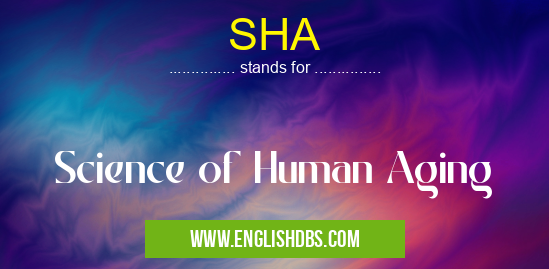What does SHA mean in RESEARCH
The Science of Human Aging (SHA) is a field of research dedicated to understanding the biological and physiological changes that occur during the aging process. SHA is an interdisciplinary field, with researchers from all fields of science and medicine, such as genetics, physiology, psychology, biology, sociology and anthropology contributing to its body of knowledge. The aim is to gain a deeper understanding of the mechanisms that lead to age-related health problems and uncover strategies for delaying or preventing them.

SHA meaning in Research in Academic & Science
SHA mostly used in an acronym Research in Category Academic & Science that means Science of Human Aging
Shorthand: SHA,
Full Form: Science of Human Aging
For more information of "Science of Human Aging", see the section below.
Essential Questions and Answers on Science of Human Aging in "SCIENCE»RESEARCH"
What are some common questions that SHA investigates?
Common questions asked by scientists researching the Science of Human Aging (SHA) include: What causes aging? How can aging be delayed or prevented? How do lifestyle factors such as diet and exercise affect the aging process? What role does genetics play in aging? What treatments are available for age-related diseases and conditions? How can social structures support healthy aging?
What types of research methods are used in SHA studies?
A variety of research methods are used in SHA studies including laboratory experiments, animal models, clinical trials, surveys, interviews and observational studies. Depending on the question being investigated, researchers will choose from different techniques suitable for their study design. For instance, cell cultures may be used to analyze the effects of certain genes on longevity; surveys may be used to assess people's attitudes towards aging; or longitudinal studies may be conducted to track changes in behavior over time. Each type of method has its own advantages and limitations which should be taken into consideration when designing a study.
What advances have been made in the field so far?
Advances made in the Science of Human Aging (SHA) include identifying genetic markers associated with longevity; uncovering potential biomarkers that could predict health outcomes related to aging; discovering ways in which lifestyle interventions such as nutrition and exercise can positively affect health outcomes; identifying potential therapies targeted at delaying or preventing age-related diseases; developing systems designed to meet the specific needs of older people; as well as studying how government policies affect wellbeing among older people. These are just a few examples — more detailed information about progress within this field can be found online or through academic publications.
Who typically works within this field?
The Science of Human Aging (SHA) employs researchers from multiple disciplines including genetics, biochemistry, epidemiology, nursing, gerontology, psychology and many other related fields. It's also important for multi-disciplinary teams to work closely together so they can take advantage of different perspectives and ensure effective communication across specialties. This kind of collaboration is essential for making progress within this area due its complexity and intersection with other disciplines such as sociology and public health.
Are there any ethical considerations when conducting research in this field?
Yes — ethical considerations are always important when conducting any type of scientific research regardless of subject matter. Specifically when working on topics related to human aging it's important for researchers to think about issues such as autonomy (respecting an older person's choice about whether or not they want to participate), privacy (protecting confidential data) informed consent (ensuring participants understand what involvement entails), benefits versus risks (balancing any potential benefits against any risks involved). It's therefore important for anyone working in this area to make sure these considerations are taken into account before conducting any type of study involving elderly people or those at risk due to advanced age.
Final Words:
In conclusion then it is clear that studying human aging through The Science Of Human Aging helps us better understand how biological processes change over time leading into physiological decline eventually leading into chronic diseases amongst elderly making it possible for us create preventive measures which help us enjoy longer healthier life expectancy while also developing therapies along with treatments according counseling elderly populations on healthy life styles while taking care not disregarding ethics associated with population ageing.
SHA also stands for: |
|
| All stands for SHA |
